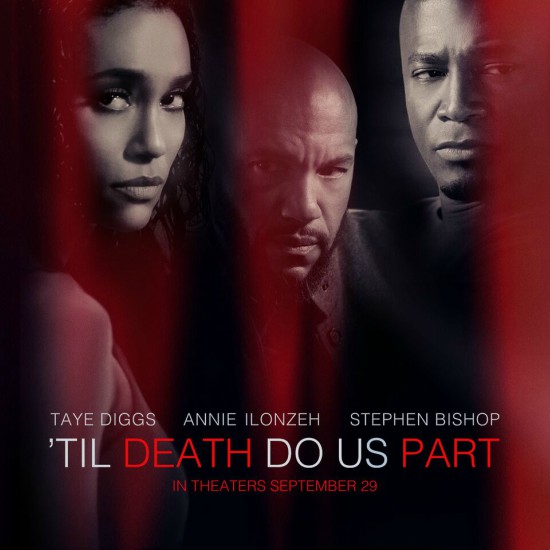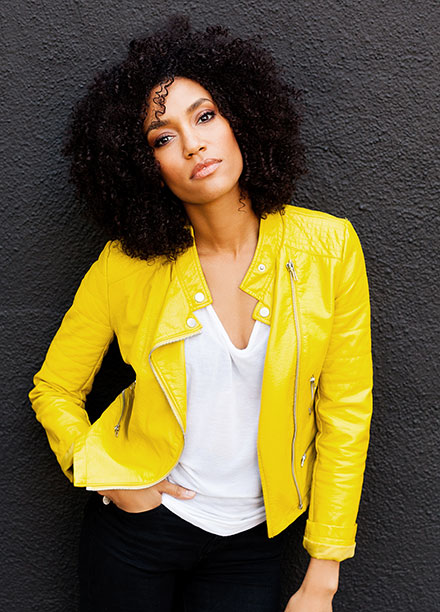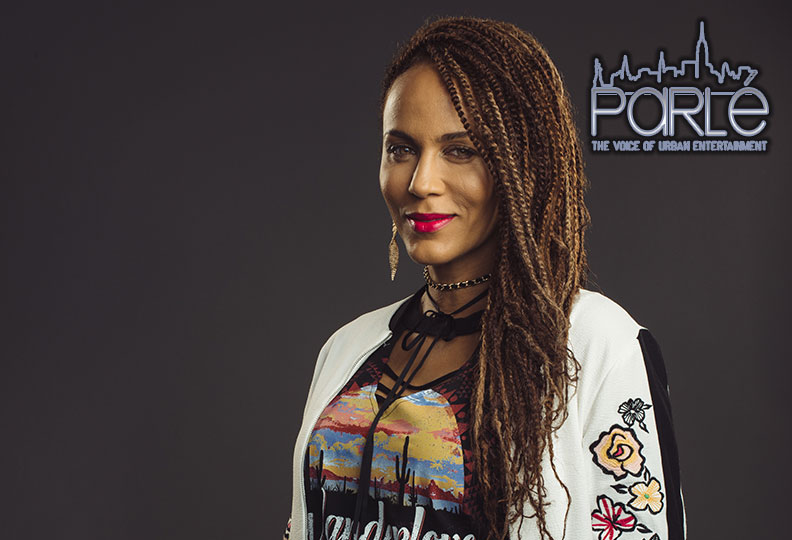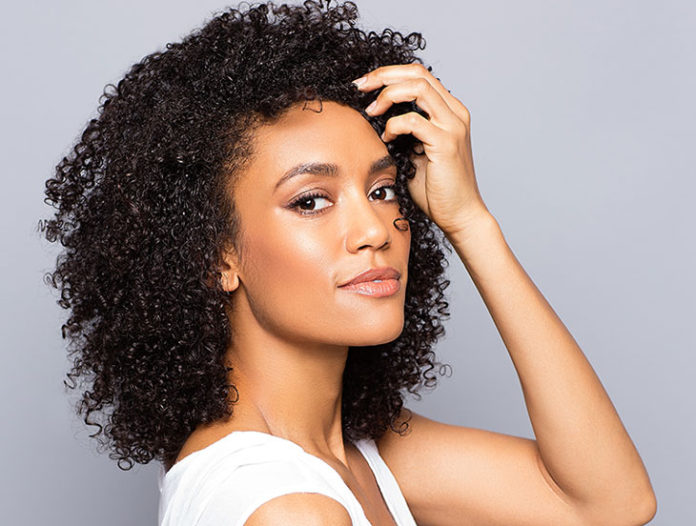Actress Annie Ilonzeh Opens Up About Her Battle With Domestic Abuse, Colorism in Hollywood, & Lack of Women Equality
This talented Texas-bred actress has been blazing the box offices all summer seventeen. Perhaps, you last saw her in the celebrated Tupac biopic, All Eyez On Me, portraying Tupac’s love interest, ‘Kidada Jones’, the daughter of entertainment’s proclaimed Godfather, Mr. Quincy Jones. Or, more recently, in the Chris Stokes-directed thriller film, ‘Til Death Do Us Part, alongside Stephen Bishop (Being Mary Jane) and Taye Diggs. Either way, Annie Ilonzeh is definitely a face worth remembering.
Though Ilonzeh was born and raised in ‘The Lone Star State’ of Texas, she uprooted to Los Angeles, California, back in 2006, in pursuit of an acting career. Putting her longtime dreams of becoming a professional basketball player to the wayside, Ilonzeh became highly intrigued with the world of show business and stopped at nothing to see what it had to offer. Within just a year, she was already snagging high-profile ad campaigns and TV appearances.
In 2010, she gained her breakout role as ‘Maya Ward’ in the daytime soap opera, General Hospital. Since then, along with a nifty list of film credits, Ilonzeh has also appeared in an abundance of other TV series, such as Entourage, The Game, ABC’s Charlie’s Angels revamp, and FOX’s top drama series, Empire.
However, as of late, Ilonzeh really started the conversation, latterly personating an abused wife, seeking a way out at all costs, in the newly-released ‘Til Death Do Us Part. The film, which features Hollywood heavy-hitters Stephen Bishop, Taye Diggs, and Malik Yoba, hit cinemas, worldwide, on September 29th and highlights a reality for many battered women around the world. The screenplay was written by former R&B star Marques Houston and his business partner, Chris Stokes.
As a victim of domestic violence, herself, portraying the starring role of ‘Madison Roland’ was very important to Ilonzeh, she says. She also admits that it actually helped her heal some old wounds that she had, and the role provided a sense of mental and emotional liberation.
Although Ilonzeh has dealt with her share of personal struggles, behind the scenes, she’s also faced some on the scene, too. The actress opened up about her challenges with colorism within the film industry, as well as the lack of equality for women, and even more in our interview.
Check out our exclusive one-on-one below!
Parlé Mag: Let’s dive into your latest film, ‘Til Death Do Us Part. As we know, you take on the starring role of ‘Madison Roland’, and your character endures something that, sadly, a lot of other women can relate to, which, in this case, is domestic abuse. So, tell us, when initially viewing the script, was it something that you could personally relate to, yourself, as well?
Annie Ilonzeh: Yeah! At first, I didn’t understand why I was feeling emotions that were different from when I would read other scripts. These emotions were stronger and painful. So, I was like, ‘This is personal.’ I realized that I was kind of digging up and opening personal scars that I had that were very similar to what Madison experienced. I was in an abusive relationship, years ago, and I had buried it. Obviously, there were still emotional scars and all that from it.
Parlé Mag: Wow.
Annie Ilonzeh: I had just, somehow, swept it under the rug and not really dealt with it, on a very deep, emotional level. I think that the more you bury something, the more your consciousness of it goes away; you try to disintegrate the memory, too. So, it’s not something that you think about all the time. Then, years later, it’s not as powerful as it was before. But, if there’s something that’s that personal or that can resonate that strong with you, it erupts again. It’s like that volcano that never disintegrates and goes away, completely; it’s just kind of dormant. So, yeah, it erupted, and I guess that’s when I really knew that this project came to me for my career but, also, for Annie, and for women out there in situations like that, that I, now, had a duty to tell. I could tell it because I was in it.
Parlé Mag: Being that this is something that you had experienced yourself, and no one really wants to relive those types of things, was it more difficult for you to become vulnerable enough, on screen, to actually portray this character?
Annie Ilonzeh: It really was! It really, really was. There were layers upon layers of coverage that I put over it just to make it go away. So, I dug it up, but it’s like you don’t want to dig it up! When something is done, and you know it’s really done, you’re like, ‘I’m done! I suffered for as long as I suffered—emotionally, physically, all of these things. I hurt so bad. Like, he doesn’t exist, it doesn’t exist, that girl doesn’t exist anymore! Everyone is done.’ You thought that all of it was dead, but then, all of a sudden, they rise from above. So, it was, surprisingly, a lot harder than I thought. You know? To really go there. My body was just rejecting the idea of wanting to bring it up again, and it was so, so deep. I knew that I had to keep digging, keep digging, keep digging, and I just knew that there was no way that I could do this and not go back and tell a story for every other woman who’s experiencing it, right now, or have [experienced it].
Parlé Mag: Abuse, of any kind, is definitely still a sensitive topic in today’s society. No one wants to talk about the fact that this is actually a real thing that real people go through. Why do you think that is?
Annie Ilonzeh: It’s so painful. Whoever’s on whatever side, I know that it’s painful, and it’s shameful, too. It’s embarrassing; it’s all of these emotions that swirl together, that are very uncomfortable, and no one wants to just live in discomfort. No one wants to live in the sickness of pain and hurt. You know? We want to be happy, or we, at least, just want to be comfortable.
Parlé Mag: Of course.
Annie Ilonzeh: It’s just not welcome, and, I think, when we think about acknowledging it, we think like, “Oh, okay. Well, you’re acknowledging it, saying it’s okay? Let’s talk about it because you’re okay with it.” No, no, no, no, no! It’s not about talking about it because you’re okay with it; it’s about talking about it because you’re okay with acknowledging that it happened and finding solutions, finding your power, finding your redemption, finding yourself again, and, hopefully, being able to share it with someone else. I know I didn’t want to acknowledge it because I felt like I would be saying, ‘It’s okay.’ or ‘I’m okay with what I went through.’ And, I’m not! I’m not okay with what I went through, at all. I don’t think that there’s anything okay with it, but I do think that it’s okay to acknowledge it and talk about it. People get so nervous and weird! I know because I do, too! But, it happened. ‘How do we move forward?’ We move forward by acknowledging the problem so that we can get a solution, not just burying it.

Parlé Mag: How do you hope ‘Til Death Do Us Part will kind of set that table for dialogue and educate others who may be or have been a victim of domestic abuse?
Annie Ilonzeh: Well, I do know that, after the premiere—we premiered it in Atlanta, New York, and L.A.—several women came up to me and were like, “I was in that. Oh, my God, I was in that. Thank you so much. I felt that.” I was like, ‘Well, I was in it, too.’ There are some actors and actresses who are the vessel for the person’s voice, and maybe they haven’t been through it, linear, like I have, but they are still the vessel for it. That’s great, as well. But, the fact that women had the courage to come up to me and say not just, “Oh, that was a great job, and I felt that.” But, “I felt that because I was in that. You got it, and you told the story. Thank you so much; thank you for that. That made me feel better.” I felt comfortable enough to say, ‘I was in it, too.’, and I feel comfortable enough now, to say, ‘I was in it, too.’ I think that if we practice more, practice makes perfect, and it makes it easier to get a little more loose. You know? Then, we can talk about it and acknowledge that there is an epidemic of violence, especially in the black community. We don’t talk about this. Sexual abuse—among men and women, girls and boys, within the household, within family units, is shameful, for some reason. That might date back to decades before when we were supposed to just be the ‘strong African Americans’ because otherwise, we were weak, and we were slave-like. That’s so not true. I mean, you can be put in horrible, weak situations and still be a strong, intelligent King or Queen.
Parlé Mag: Most definitely! I agree.
Annie Ilonzeh: To see the images of these people, on the screen, they’re black, and they’re going through it. I hope that people can get just a little more comfortable with voicing their opinions and their experiences, too.
Parlé Mag: In most abusive relationships, women are either made to feel afraid to speak out or are continuously tried to be silenced by others. However, this is something that we generally see in everyday life, not just in domestic violence. So, do you find that in Hollywood, too? In terms of women being disregarded, discriminated, or underestimated?
Annie Ilonzeh: Absolutely! Absolutely. If a man makes a comment or says a comment directed specifically at you, it’s harassment. The kind of comment that I’m talking about, sexual harassment, that’s just inappropriate, out of context, completely, and it’s harassment. You find yourself saying, ‘Wait. Am I bad? Is it bad if I say something? Will I get in trouble if I say something or if I acknowledge it? Should I stay in my place?’ You hear that term a lot, especially with women, “Stay in your place.” It’s like, ‘Well, what’s my place, and whoever established this?’
Parlé Mag: Right!
Annie Ilonzeh: [laughs] My place is me, my temple, and I do everything to honor my temple. That’s what I do. If you can tell me that you know a better place than that, then you’re God! Like, who are you? But, we’re told this kind of stuff since we’re young. It definitely happens in Hollywood. Now, all of a sudden, you see all of these people coming out about the Harvey Weinstein [case] and him harassing all of these women. So many women! This happens all the time, on a daily basis. You could be in a dress on set. Someone complimenting your dress, that’s fine, but then when they take it too far, they make it a joke, you feel uncomfortable—and it’s a sexual joke, at that, now, you’re looked at as a sexual object, wearing this dress. Your body parts are being put on display, just for the laugh of the joke. That’s when it’s like, ‘No, dude!’
Parlé Mag: It’s not acceptable!
Annie Ilonzeh: Yeah, it’s not acceptable, but that happens all the time! If you say something, it’s like, “Well, he didn’t mean to.” It’s just instantly not even a little slap on the wrist to the man. Like, why? To me, it’s just not as common. We’re sitting here like it’s okay that this happens all the time. So, with this film, and, also, with the Harvey Weinstein [case] and all of these allegations and stories coming out, I’m happy that there is a spotlight on this, and people know! Not even just in entertainment, hopefully, everyone around the world is like, “Okay, if this bighead honcho dude, and, here we go, white man, is getting scrutinized, as much as he is, and fired and all of that, then, hopefully, I can stand up and protect myself, too.” Look, you have Nate Parker, who made a beautiful movie, a successful actor, too; he’s talented as hell, on all fronts, and once his movie comes out, all of a sudden, they want to bring up the allegation of how he may or may not have raped someone in college. He got off, but, now, his entire career is ruined, off of an allegation, where he got off, in college! This is Harvey Weinstein; this has been going on for years. No one has ever brought it up because he’s a big, huge white man who runs everything, but when it comes to the black man, they’ll shoot you down, real quick. So, if they’re doing it with this white man, I hope everyone has the courage to come out and protect their temple.
Parlé Mag: Definitely! It’s something that needs to be talked about. It’s just sad that, even in Hollywood, men still feel entitled to violate women. It’s honestly sad.
Annie Ilonzeh: Absolutely! It’s an ownership that they feel that they have, they’ve earned, somehow, and they deserve it. It’s just not fair, whatsoever.

Parlé Mag: At all. So, as an actress, how do you hope to help rid the social stigmas placed upon women of color, in general, through the characters that you portray?
Annie Ilonzeh: One, I hope to portray more, so that you see our images more. But, also, I like to question the business, and ‘why’. If I read a script, and it says ‘white’, I’m like, ‘Why does this girl have to be white? Why?’ You know what I mean? This is just a woman; she can be black. We need to call them and say, ‘This is a black girl.’ Why do we have to hit some quote where we can’t have too many black people because then it’s a black film? Who cares? I want to question, push the boundaries. It’s boundaries that we shouldn’t even have up, but we do. That’s just the facts, so we don’t have to play the blame game or be mad as to ‘why’. Let’s try to change it. Now, I’ve gotten way more inspired to write, especially after seeing Shonda Rhimes, Donald Glover, and some of these great talents who are telling our story and getting greenlit. I want to continue in that; I want to be in that universe with them, as well, so that we can expand on the images that we see on TV, so that we see more of us, more people of color, and our stories, too. So, just keep pushing the limits and being fearless and not being afraid of mediocrity, even though, we’re stretching that a little bit, now. I’m not okay with these low ratios, even though, they’re starting to be stretched, too, continue! Don’t just say, “Well, they’re listening now, so let’s sit!” I had a friend of mine say that, who’s actually a black actor.
Parlé Mag: Really?
Annie Ilonzeh: He was like, “They’re listening now.”, and then he just kind of sat back. I’m like, ‘Okay, this is when you apply pressure!’
Parlé Mag: Exactly! You keep going!
Annie Ilonzeh: Yes! We need to make it uncomfortable in order to make it comfortable. That’s the only way. It’s like trying something new. When a kid rides a bike for the first time, when you go and you do a new workout for the first time, it is uncomfortable until you do it so many times that it’s not. That’s what we have to keep doing.
Parlé Mag: What is your dream role?
Annie Ilonzeh: I want to be a ninja, like a superhero. Not a ninja like Ninja Turtles. [laughs] I want to be a superhero, so bad.
Parlé Mag: Like Wonder Woman?
Annie Ilonzeh: Yes! I want to be like a Wonder Woman. I did Charlie’s Angels, so that was kind of like I was able to live out my dreams. To me, a superhero is my mom! To me, she can stop time, jump over buildings, and she can go through walls! [laughs] You know what I mean? But, yeah, maybe the symbolics of that put into a realistic type of movie. A superhero. One, because I’m a super tomboy, and I love the athleticism. I love my craft, and I love acting; I love being in front of the screen. But, two, again, so we can see those images. It’s like, back in the day, when all of the commercials were just white Barbies, and there was a black Barbie but there wasn’t a lot.
Parlé Mag: They were overshadowed!
Annie Ilonzeh: Always. It’s the same, to me, with superheroes and stuff. I would love to see more. Of course, I would love to be one, but I would love to see more. So, that, to me, is my vision, my dream, and what I’m always striving for in this.
Parlé Mag: Throughout your acting career, what’s the best piece of advice you’ve received that has contributed to honing your craft?
Annie Ilonzeh: I worked with Charlize Theron on this show called the Hatfields and McCoys; we did a reboot on NBC, and she was one of our executive producers. We bonded because she had adopted her child, and he’s black. So, she was asking about the things that white women might not necessarily think about, really! I say that because my mom is white, and she didn’t think about it. You know, like, there are certain places to go take your child to get their hair cut, the salon, the [barber] shop, versus this barber. I was like, ‘It’s so crazy that you remind me of my mom with these questions.’ So, we had really bonded over that. She was talking about some scenes we were doing, and she was like, “Your eyes are so powerful. You listen, and you’re so aware. Don’t ever stop that. Remember this conversation.” She said a few other things that I will keep, but she said, “Remember this conversation when you’re up there, giving your speech for your Emmy.” I was like, ‘Whaaaat!’ Then, she was like, “Your eyes say so much, and you listen, and you care. You want people to listen to you.” So, yeah, I’ll never forget that conversation.
Parlé Mag: What advice would you give other aspiring actors or actresses coming into the industry?
Annie Ilonzeh: Stay fearless! Here’s the thing, actually, embrace the fear, but know that you are fearless. There is fear; it’s scary. Sometimes, we are fearful, majority of the time, but we are fearless human beings. There are things that are happening in the world, naturally, and it’s like, ‘How the hell did that happen?’
Parlé Mag: [laughs]
Annie Ilonzeh: It’s just a fearless thing. They’re fearless situations. When that storm comes, you can be fearful, scared, and go and take shelter, but, once it’s over, don’t let it keep you in the fear where you’re like, “Okay, I can’t go out and walk around; I can’t go do anything.” No! Now, that’s your time to go embrace your fearlessness and continue to go. It has to be unapologetic fearlessness that gets you through this. Otherwise, that fear is a lot stronger than you think, and it will take you if you don’t have a basis of fearlessness. I always tell myself that. I really do. I always say, ‘ Be unapologetic, to a certain extent, in your acting. Take those risks.’ In taking risks, you’re being fearless.
Parlé Mag: 2017 has already been such a great year for you. You’ve starred in two box office hits, this year. Of course, ‘Till Death Do Us Part, and, recently, the acclaimed Tupac biopic, All Eyez on Me. What’s next for you?
Annie Ilonzeh: I hope to become a superhero! I really do! [laughs] I am writing, right now, a couple of scripts. A movie and a pilot for TV, which I really hope to get out there. I’m really excited about it! Again, it’s our voices. One of them is, particularly, our journey, or my journey, I guess, as a mixed woman, in this world, in this career, and this industry. Especially being that, sometimes, you don’t know, like, ‘Society, hey, guys, am I allowed to identify with black today? Am I allowed to identify? Am I too black? Am I too white?’ You know, all of those things that other people are, somehow, telling you, just because we’re so used to wanting to check labels.
Parlé Mag: So, is that still a challenge for you? As a mixed woman, yourself, being labeled in the industry?
Annie Ilonzeh: I do. When I got Charlie’s Angels, I got this tweet from this black girl, and she was like, “Oh, yeah, they hired you because you’re the ‘token black girl’.” I was just like, ‘Why can’t I just be a black girl or girl?’ You are a black woman, my sister; you’re my sister, and you’re looking at me and telling me I’m ‘token’.
Parlé Mag: Right.
Annie Ilonzeh: Why would you do that? You put yourself down, in a way—or put whoever else down, who’s not ‘token’, and made me better than when I never looked at it like that! I feel like I’m representing black and the culture, or mixed, or whatever. I never even looked at it like that. And, I still see that, sometimes. I’ve gotten the ‘not dark enough’ or ‘not light enough’. You know, like, “She’s black, but she’s not ‘black’.” So, it still happens, but the solution to that is to go create and just continue to open the dialogue up to people, and let them know, ‘Look, that’s a painful statement that you’re making, and let me tell you why.” I have an African dad! From the motherland! And, I have a white mother! A white mother. They risked it all, okay? To have five children. If I’m not black, I don’t what else is black. And, if I don’t understand white, I don’t know who else does. But, why does that have to be an issue?
Parlé Mag: It shouldn’t have to be!
Annie Ilonzeh: It shouldn’t!
Catch up with Annie Ilonzeh on social media:
Twitter
Instagram
Readers Also Liked:
 [INTERVIEW] Actress Nicole Ari Parker Gives Insight On Her Latest Film, Downsized, Marriage, & Being A Mother
[INTERVIEW] Actress Nicole Ari Parker Gives Insight On Her Latest Film, Downsized, Marriage, & Being A Mother
Keith Robinson Opens Up About Role In Tupac Shakur Biopic + His Latest Album, Love Episodic
[INTERVIEW] Hollywood’s New “It Guy”, Keith Robinson Shares His Journey

